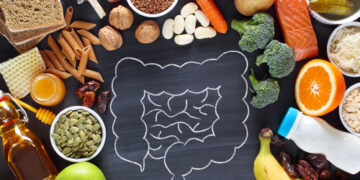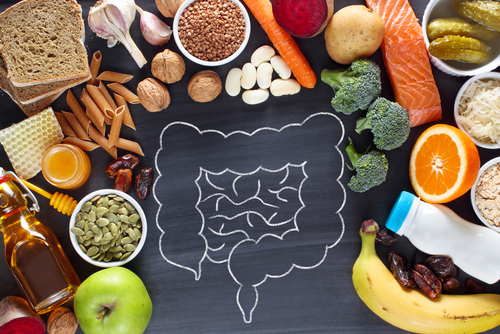Understanding the Leak
“Leaky gut” isn’t just a wellness buzzword—it’s a term often used to describe increased intestinal permeability, a condition where the lining of the gut becomes compromised. When this happens, tiny gaps in the intestinal wall allow undigested food particles, toxins, and bacteria to pass into the bloodstream. This can trigger inflammation, food sensitivities, fatigue, and a wide range of digestive symptoms.
While research into leaky gut is still evolving, many practitioners agree that supporting the intestinal barrier—the thin layer of cells that separates the gut from the rest of the body—is key to reducing symptoms and restoring balance. Fortunately, certain foods can help rebuild and protect this barrier, starting from the inside out.
Ad Banner #1
— Placeholder for the first advertisement —
The Role of Diet in Gut Repair
The intestinal lining renews itself every few days, meaning the body is always working toward healing. But when it’s bombarded by inflammatory foods, stress, or a disrupted microbiome, this healing process gets interrupted. That’s where a gut-healing diet comes in.
Foods that reduce inflammation, repair tissues, and feed beneficial bacteria all contribute to a stronger, more resilient gut lining. Among the most powerful healing allies? Collagen, bone broth, and an anti-inflammatory, whole-food diet.
Collagen: The Building Block of Gut Lining
Collagen is a structural protein that plays a crucial role in maintaining the integrity of connective tissues—including those in the gut lining. It contains amino acids like glycine, proline, and glutamine, which may help soothe inflammation and support tissue regeneration.
When the gut lining is weakened, these amino acids become even more important. Glycine, for example, helps regulate immune function and reduce oxidative stress, while glutamine may help “seal” tight junctions between intestinal cells—one of the key mechanisms behind leaky gut.
Sources of collagen or collagen-building nutrients include:
-
Bone broth (especially slow-cooked)
-
Collagen peptides (from grass-fed sources)
-
Egg whites
-
Fish skin and chicken skin
-
Vitamin C–rich foods (like citrus, bell peppers, and strawberries), which help the body synthesize collagen naturally
Bone Broth: Nourishment That Soothes
Homemade bone broth is more than just a comfort food—it’s one of the most popular traditional remedies for digestive distress. When simmered over hours, bones release collagen, gelatin, amino acids, and trace minerals into the broth. The result is a nourishing, easy-to-digest liquid that gently supports tissue repair and reduces irritation.
Many people with leaky gut find that starting the day with a warm cup of bone broth helps ease discomfort and kickstart digestion. It can also be added to soups, stews, or sauces for extra nutrients.
Tips for a gut-friendly bone broth:
-
Use bones from organic or grass-fed animals.
-
Simmer with apple cider vinegar to help draw minerals out of the bones.
-
Include vegetables and herbs like garlic, onions, parsley, and turmeric for added anti-inflammatory benefits.
Anti-Inflammatory Diet: The Foundation of Healing
One of the key contributors to a damaged intestinal lining is chronic, low-grade inflammation. A gut-healing diet focuses on removing common irritants while flooding the body with anti-inflammatory, nutrient-dense foods.
Key elements of an anti-inflammatory, gut-healing diet include:
-
Omega-3 rich foods: Wild-caught salmon, sardines, chia seeds, and flaxseeds
-
Colorful vegetables: Especially leafy greens, beets, carrots, and squash, which are rich in antioxidants and fiber
-
Healthy fats: Avocados, olive oil, coconut oil, and ghee support tissue repair and hormone balance
-
Fermented foods: Sauerkraut, kimchi, kefir, and yogurt help restore microbial diversity
-
Low-sugar, gluten-free whole foods: Limiting added sugars and processed carbs may reduce inflammation and help repair gut lining
-
Herbs and spices: Turmeric, ginger, rosemary, and oregano all have natural anti-inflammatory properties
Ad Banner #2
— Placeholder for the second advertisement —
Foods to Limit During Gut Repair
While healing, it’s helpful to temporarily avoid foods that may irritate the gut lining or worsen inflammation. These often include:
-
Refined sugars and artificial sweeteners
-
Alcohol and caffeine in excess
-
Gluten-containing grains (for some individuals)
-
Industrial seed oils (canola, soybean, corn oil)
-
Highly processed or fried foods
Every person’s body is different, so it’s helpful to track symptoms and work with a practitioner to identify any personal food sensitivities.
A Gentle, Restorative Approach
Healing a leaky gut doesn’t happen overnight—but the body is always working in your favor when given the right tools. Instead of restrictive extremes, focus on building each meal around calming, whole foods. A bowl of slow-cooked soup, a side of sautéed greens with olive oil, or a morning smoothie with collagen and berries can all become part of your gut’s healing process.
Consistency is more important than perfection. Over time, small, intentional choices can lead to big changes in how your gut—and your entire body—feels.
























